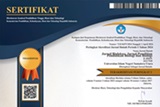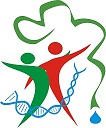Fostering communication and collaboration skills in biology education through Problem-Oriented Project-Based Learning (POPBL)
Abstract
The 21st-century education requires students to be able to master 21st-century skills, namely communication and collaboration skills. Communication and collaboration skills are very important for students to develop their personalities in learning, because they cause individual and group interaction to gain knowledge and learning experience from each other. 21st-century skills can be practiced through the study of biology, because biology has values of scientific nature, cooperation, respect for the opinions of others, and openness to various phenomena that have just occurred. This study aims to measure the influence of problem-based and project-based learning on the communication and collaboration skills of grade X students of SMA Negeri 10 Malang. The implementation of this study used the Problem-Oriented Project-Based Learning (POPBL) model to direct students to create creative products. The method used in this study is a quasi-experimental research using the pretest post-test nonequivalent control group design. Communication and collaboration skills were measured using instruments in the form of self-assessment and peer assessment questionnaires. The results of the questionnaire were analyzed using the analysis of covariance (ANCOVA) test. The results of the study showed that the implementation of Problem-Oriented Project-Based Learning (POPBL) has a significant effect on students' communication and collaboration skills. These findings suggest that problem-based and project-based learning models can develop students' communication and collaboration skills.
Keywords
Full Text:
PDFReferences
Abraham, I., & Supriyati, Y. (2022). Desain kuasi eksperimen dalam pendidikan: Literatur review. Jurnal Ilmiah Mandala Education, 8(3), 2476-2482.
Arifin, Z. (2017). Mengembangkan Instrumen Pengukur Critical Thinking Skills Siswa pada Pembelajaran Matematika Abad 21. Journal THEOREMS (The Original Research of Mathematics), 1(2), 92-100.
Bara, G., & Xhomara, N. (2020). The effect of student-centered teaching and problem-based learning on academic achievement in science. Journal of Turkish Science Education, 17(2), 180-198.
Barge, S. (2010). Principle of Problem and Project Based Learning: The Aalborg PBL Models. Aalborg University.
Darmawan, E., Yusnaeni, Ismirawati, N., & Ristanto, R. H. (2021). Strategi Belajar Mengajar Biologi. Putaka Rumah Cinta.
Fitriyani, D., Jalmo, T., & Yolida, B. (2019). Penggunaan problem based learning untuk meningkatkan keterampilan kolaborasi dan berpikir tingkat tinggi. Jurnal Bioterdidik, 7(3), 77-87.
González-Pérez, L. I., & Ramírez-Montoya, M. S. (2022). Components of Education 4.0 in 21st century skills frameworks: systematic review. Sustainability, 14(3), 1493.
Greenstein, L. (2012). Assessing 21st Century Skills: A Guide to Evaluating Mastery and Authentic Learning. Corwin A Sage Company.
Ibrohim, I., Nurdiana, F. R., Estiningsih, Y., & Martiana, C. (2014). Pengembangan Perangkat Pembelajaran Ipa-Biologi Berbasis Diskoveri-Inkuiri Dengan Sumber Belajar Potensi Lingkungan Lokal Kabupaten Pasuruan. Proceeding Biology Education Conference: Biology, Science, Enviromental, and Learning, 11(1), 1050-1059.
Ibrohim, I., Purwaningsih, E., Munzil, M., Hidayanto, E., Sudrajat, A. K., Saefi, M., & bin Hassan, Z. (2022). Possible links between Indonesian science teacher’s TPACK perception and demographic factors: Self-reported survey. EURASIA Journal of Mathematics, Science and Technology Education, 18(9), em2146.
Iftitahurrahimah, I., Andayani, Y., & Al Idrus, S. W. (2020). Pengaruh model problem based learning (PBL) terhadap kemampuan komunikasi siswa materi pokok larutan elektrolit dan non-elektrolit. Jurnal Pijar Mipa, 15(1), 7-12.
Latada, F., & Kassim, H. (2017). Project-oriented problem-based learning (Popbl): an initiative to enrich soft skills among students at a public university. Journal of Global Business and Social Entrepreneurship (GBSE), 1(3), 75-83.
Lufri, L., Elmanazifa, S., & Anhar, A. (2021). The effect of problem-based learning model in information technology intervention on communication skills. Ta'dib, 24(1),
-52.
Nichols, J. (2013). 4 Essential Rules of 21st Century Learning.
http://www.teachthought.com/learning/4-essential-rules-of-21stcentury-learning/
Nurwahidah, N., Samsuri, T., Mirawati, B., & Indriati, I. (2021). Meningkatkan Keterampilan Kolaborasi Siswa Menggunakan Lembar Kerja Siswa Berbasis Saintifik. Reflection Journal, 1(2), 70-76.
Ofstedal, K., & Dahlberg, K. (2009). Collaboration in Student Teaching: Introducing the Collaboration Self-Assessment Tool. Journal of Early Childhood Teacher Education, 30(1), 37–48. https://doi.org/10.1080/10901020802668043
Owens, A. D., & Hite, R. L. (2022). Enhancing student communication competencies in STEM using virtual global collaboration project based learning. Research in Science & Technological Education, 40(1), 76-102.
Pratama, M. A. R., Cahyono, E., & Aggraito, Y. U. (2019). Implementation of problem based learning model to measure communication skills and critical thinking skills of Junior High School Students. Journal of Innovative Science Education, 8(3), 324-331.
Raiyn, J., & Tilchin, O. (2015). Higher-Order Thinking Development through Adaptive Problem-Based Learning. Journal of Education and Training Studies, 3(4), 93-100.
Riskayanti, Y. (2021). Peningkatan Keterampilan Berpikir Kritis, Komunikasi, Kolaborasi Dan Kreativitas Melalui Model Pembelajaran Project Based Learning Di SMA Negeri 1 Seteluk. SECONDARY: Jurnal Inovasi Pendidikan Menengah, 1(2), 19-26.
Rongbutsri, N. (2017). Students Using Online Collaborative Tools in Problem Oriented Project Based Learning. Aalborg Universitetsforlag. https://doi.org/10.5278/vbn.phd.hum.00072
Sari, Y. (2023). Problem Oriented Project Based Learning Meningkatkan Hasil Belajar dan Kemampuan Berpikir Kritis Siswa. Bioma: Jurnal Biologi dan Pembelajaran Biologi, 8(1), 61-75.
Trilling, B., Fadel, C. (2009). 21st century skills: learning for life in our times. Jossey-Bass.
Urwani, A. N., Ramli, M., & Ariyanto, J. (2018). Analisis keterampilan komunikasi pada pembelajaran biologi sekolah menengah atas. Jurnal Inovasi Pendidikan IPA, 4(2), 181-190.
Van Compernolle, R. A., & Williams, L. (2013). Sociocultural theory and second language pedagogy. Language Teaching Research, 17(3), 277-281.
Winarni, W., Santosa, S., & Ramli, M. (2016). Penerapan model discovery learning untuk meningkatkan oral activities siswa SMA. Bioedukasi, 9(2), 56–62.
Woods, D. (2014). Problem-Based Learning (PBL). McMaster University. http://chemeng.mcmaster.ca/problembased-learning.
Zubaidah, S. (2016). Keterampilan Abad Ke-21: Keterampilan yang Diajarkan melalui Pembelajaran. Seminar Nasional Pendidikan, 2(2), 1-17. https://doi.org/10.1021/acs.langmuir.6b02842
Zubaidah, S. (2018). Keterampilan Abad Ke-21: Bagaimana Membelajarkan dan Mengaksesnya. National Conference of Tantangan Biologi dan Pendidikan Biologi Abad-21. Pendidikan Biologi FKIP Universitas Islam Riau.
DOI: http://dx.doi.org/10.30821/biolokus.v7i2.3866
Refbacks
- There are currently no refbacks.
Copyright (c) 2024 Jurnal Biolokus: Jurnal Penelitian Pendidikan Biologi dan Biologi
indexed by :












